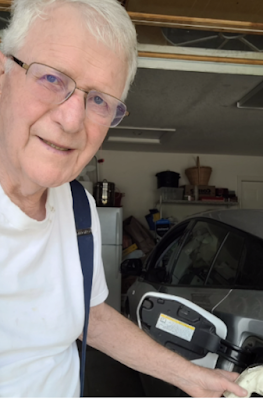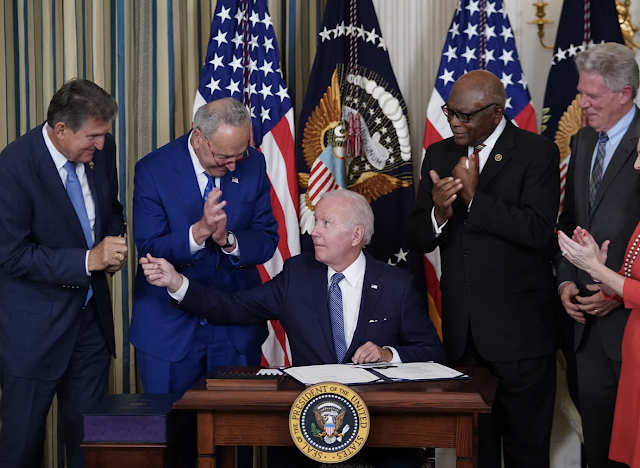Biden's student loan forgiveness critics are hypocrites.
That doesn't mean his college loan forgiveness plan is good policy or good politics.
Much of the defense of Biden's college loan forgiveness plan centers on "whatabout." I used whatabout myself in yesterday's blog post. Critics of Biden's plans are hypocritical. Everyone is hypocritical. Government burdens and benefits are uneven and everybody gets a little of each. No one has clean hands.
My post yesterday likened college loan forgiveness to the home mortgage interest deduction. The comparison is imperfect. The mortgage deduction is long-established and people know to take it into consideration when doing home financing. The college loan plan was sudden. The mortgage interest deduction went through Congress. Biden is proposing to do this on his own executive authority. But I made a whatabout comparison because the biggest beneficiaries of the mortgage interest deduction are prosperous people buying big houses. They are among those condemning the unfairness of Biden's proposal. I was pointing out hypocrisy.
We hear whatabout because the critics of student loan forgiveness included members of Congress who themselves personally received PPP loans of hundreds of thousands of dollars. They didn't need to repay those loans. Hypocrites.
Business critics of Biden's plan include people who survived the Great Financial Crisis because of multi-billion dollar bailouts of too-big-to-fail banks. Hypocrites.
And what about bankruptcy laws Trump used to stiff vendors and bondholders? Hypocrites.
Who can cast the first stone? I cannot. I got a significant bonus from my too-big-to-fail bank, a bonus made possible by the bank's government bailout.
Still, I observe problems with the Biden proposal. Bad politics is bad policy.
Biden's proposal offers loan forgiveness to borrowers with incomes up to $125,000 for an individual and $250,000 for a couple. Possibly in Manhattan, Beverly Hills, and Silicon Valley people who earn those incomes can be viewed as needy, but in most of America those people are considered to be doing very well. The median individual income in the U.S. in 2021 was $51,480. Of course people in the lower half of the median are going to resent thinking they are paying the college bills for people richer than themselves. A proposal with headline income limits of $125,000/$250,000 isn't a helping hand to the needy--a fellow victim in the struggle to get by. It signals a helping hand from non-college Americans to college-educated Americans. It is applied after the fact, so there wasn't equal opportunity to take advantage. It will look like a screwing. The ads are already out there making that point.
 |
| https://youtu.be/GEA72wFG6o4 |
Isn't the idea that the proposal helps "rich kids," as the ad says, a "Republican talking point?" Yes. It is a talking point for a reason. Biden's proposal is tailor-made for Republicans hoping to accelerate Democrats’ loss of non-college working class. What do Democrats think people like the woman in this ad would feel about the proposal? What is in it for her?
There is a second, worse problem. Democrats are positioning themselves as supporters of constitutional process in contrast to Trump-friendly MAGA Republicans who overturn elections and justify Trump's flouting of laws. Democrats disagree with Liz Cheney on most things, but she is making principled arguments about the rule of law as the central issue in American politics. Democrats can win the votes of some Trump-wary voters if they are understood to be the rule-of-law party, the party that respects norms and Constitutional limits on presidential power. Yet, Biden now says we are in an "emergency" that allows him to cancel loans on his own authority, without Congressional approval. Yikes! Both Biden and Nancy Pelosi have recently said that this was the purview of Congress--but now it isn't. Biden isn't coming across as strong and decisive. He is coming across bullied by his left flank into doing something he doesn't want to do and that he knows is illegal. The midterm election was supposed to be a showdown between Biden "normalcy" and Trump extremism. Biden is muddling that.
Democrats who are celebrating Biden's plan will have plenty of opportunity to regret it. The waitress in this ad may not be thinking about abortion this November. She may be thinking that the cafe owner's son just got a windfall and she is paying for it.
Note: To get this blog daily by email go to https://petersage.substack.com Subscribe. The blog is free and always will be.]





















